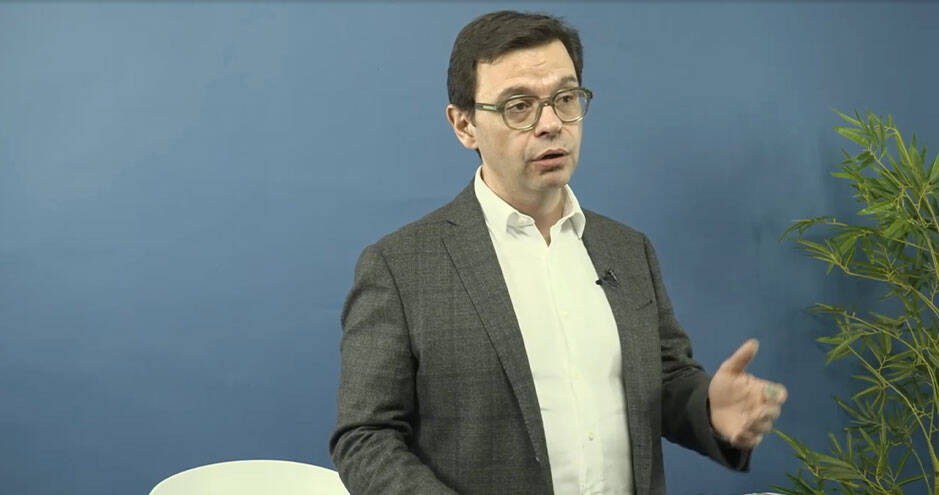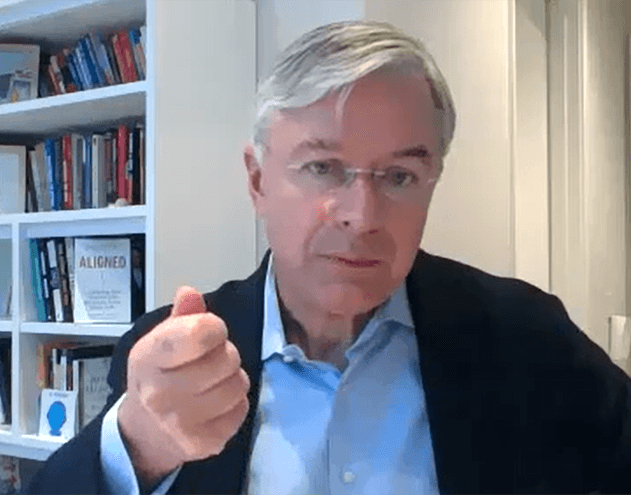How Purpose Drives Performance: Insights from Professor Rodolphe Durand
In today's fast-paced business world, just talking about purpose isn't cutting it anymore. But how exactly do leaders turn those words into meaningful action that drives results? In a recent Masterclass Reskill session, Professor Rodolphe Durand, the holder of the Joly Family chair of Purposeful Leadership at HEC Paris, and the scientific director of the Executive program “Aligning Corporate Purpose and Performance” delved into this very question. He showed us how being truthful, clear, and consistent with your purpose can actually boost business performance.

Understanding Purpose Beyond Words
"Let's define purpose. I mean, what is purpose for an organization? Purpose is the reason for being of this organization. It's the why of the organization," Professor Durand articulates, setting the stage for a deeper exploration. He emphasizes that while many companies have articulated their purpose in recent years, it's crucial to move beyond mere statements. Professor Durand highlights,
"The relationship between a purpose statement and performance is nil. The statement per se is not significantly related to firm performance."
Instead, he underscores the importance of how employees perceive and experience the purpose in their daily roles. "The way people experience the purpose, the way they feel it clearly, purpose clarity makes a difference," he asserts, debunking the notion that a purpose statement alone drives performance.
From Statement to Experience: Building a Purpose-Driven Culture
Professor Durand advocates for the development of a purpose-driven culture within organizations. He explains,
"Purpose is not about making profits. It's about reflecting on the raison d'être and embedding it in organizational practices."
This shift from a mere declaration to a tangible experience marks a pivotal step in leveraging purpose for performance enhancement. In a world full of organizations finding their own place, the way they express their core purpose differs greatly. Consider Veolia, for example, encapsulated succinctly in the phrase "resourcing the world". This concise statement opens up a detailed story that everyone, including employees and stakeholders, can understand. It's broken down further into 18 indicators, highlighting the many aspects of corporate success, known as "plural performance."
The expression of an organization's mission can take diverse forms. Some opt for the route of negation to underline their ethos. Google initially embraced "don't be evil", a directive nestled in negation. Similarly, The Body Shop's mantra, "enrich, not exploit", follows this pattern, emphasizing what the company stands against. The inclusion of a negation in an organization's purpose tends to impose more rigorous expectations on its people and overall operations.
On the flip side, a purpose that's vague or too broad can undermine collective belief and commitment.
For instance, a statement like "providing the best product for our customers" might sound good, but it lacks the depth and specificity needed to truly define an organization's core reason for being.
The Three Keys to Making Purpose Drive Business Performance
Rodolphe Durand outlines three essential levels: ensuring all leaders at every level fully embrace and embody the purpose, fostering autonomy, and recognizing and incentivizing individuals.
Embracing the Purpose
Embracing a company's purpose is like lighting a torch in a dark room—it should illuminate every corner. Yet, as emphasized by Rodolphe Durand, ensuring that all leaders fully embrace this purpose is no small feat.
While a commendable 80% to 90% of top executives adeptly articulate the company's purpose, seamlessly integrating it into its narrative and strategic choices, this clarity tends to dissipate as it filters down the organizational hierarchy. Astonishingly, a significant 60% to 80% of employees find themselves in the dark regarding their organization's fundamental mission.
Even with mission statements plastered across screens and walls, the true essence of purpose struggles to permeate throughout the organization. According to Durand, this disconnection often arises from a dearth of sincere commitment to these values among leaders, or perhaps a skepticism regarding their genuineness and practicality.
The heart of the issue lies in the organizational culture and the extent to which its leaders embody its values.
When daily practices contradict the professed mission—when shortcuts are taken and exceptions granted—the purported purpose loses credibility, eroding trust and cohesion within the team. Moreover, the incarnation of purpose necessitates sacrifice—a testament to the organization's commitment to its core values.
Lush, renowned for its ethical stance against animal testing, willingly sacrificed market opportunities to uphold its values.
Similarly, CVS Health's decision to cease tobacco sales aligns with its purpose of promoting better health, despite potential revenue losses.
As Professor Durand points out, these sacrifices underscore a commitment to walking the talk, influencing organizational behavior at every level.
Moreover, confronting challenges head-on is paramount to truly embedding purpose within an organization. Airbnb's swift response to racial discrimination on its platform exemplifies this principle. By addressing issues that contradict its purpose of inclusivity, Airbnb reinforces its commitment to fairness and equality.
However, embodying purpose goes beyond mere rhetoric—it requires making purpose tangible and aspirational within the organization. Professor Durand emphasizes the importance of creating spaces for dialogue and training where purpose is not just discussed but practiced. Without such initiatives, the proclaimed purpose risks remaining a mere intention, failing to guide decision-making and inspire action among team members.
Embracing Autonomy
Rodolphe Durand eloquently captures this sentiment, highlighting the transformative power of purpose in fostering a culture of trust and empowerment:
"Having a purpose makes you more at ease with the idea of autonomy, not seeing the other as someone who will shirk or cut corners."
This philosophy of action, grounded in the autonomy of each team member and leader, presupposes a certain level of confidence and mutual respect. It suggests that when individuals are guided by a shared purpose, they are more likely to innovate, take initiative, and contribute positively to the organization's goals. However, this approach also acknowledges the inherent risks involved—mistakes are inevitable. Yet, it is precisely this tolerance for error, underpinned by a supportive organizational culture, that can lead to groundbreaking innovations and solutions.
An illustrative demonstration of this approach comes from Hubert Joly's leadership at Best Buy.
Joly implemented a unique strategy known as the "Get Out of Jail Free card" for senior leaders, symbolizing the encouragement of experimentation and learning from mistakes. In his own words, shared on LinkedIn, Joly explained, "This is what the 'get out of jail free' cards were about: encouraging experimentation." This initiative facilitated the taking of calculated risks, creating an environment where innovative ideas could be explored, assessed, and either further developed or discarded without facing repercussions.
Recognizing People
In the intricate dance of leadership and organizational growth, recognition and incentives take center stage, serving as powerful catalysts for embracing a company's purpose. As Professor Durand aptly puts it,
"It's the people of the collective that make the organization alive and help it develop and thrive."
This statement underscores a shift from traditional top-down leadership models to one where every member of the organization is recognized as a vital ambassador of its values and mission.
Consider Lush's exceptional multi-channel communication strategy, where employees themselves serve as the voices of the organization, or Salesforce's Trailblazer stories, showcasing employees navigating challenges, reinforcing the crucial role of recognizing individuals as key drivers of organizational success.
However, mere recognition is not enough. Incentives also play a pivotal role, but they must be carefully crafted to avoid undermining intrinsic motivation. Professor Durand emphasizes the need for incentives that reward genuine and authentic initiatives while also aligning with the organization's overarching purpose.
Moreover, embedding purpose at all levels of an organization holds significant appeal to talent. Research indicates that purpose-driven cultures can attract and retain talent for longer periods, often at a lower cost than the market average. This underscores the added value that purpose brings to the compensation equation, acting as a non-financial incentive that complements monetary rewards and guides the organization towards achieving its goals while staying aligned with its core mission.
By prioritizing recognition, designing effective incentives, and fostering a culture where purpose permeates every aspect of the organization, companies can harness the full potential of their workforce. This holistic approach not only accelerates the attainment of organizational goals but also enhances financial performance, proving that the true value of purpose extends far beyond the bottom line.
Ready to lead with purpose and transform your career? HEC Paris Executive Education is here to guide you through every pivotal moment. Our leadership programs are designed to blend personal growth with professional advancement, empowering you to drive meaningful change within your organization.
